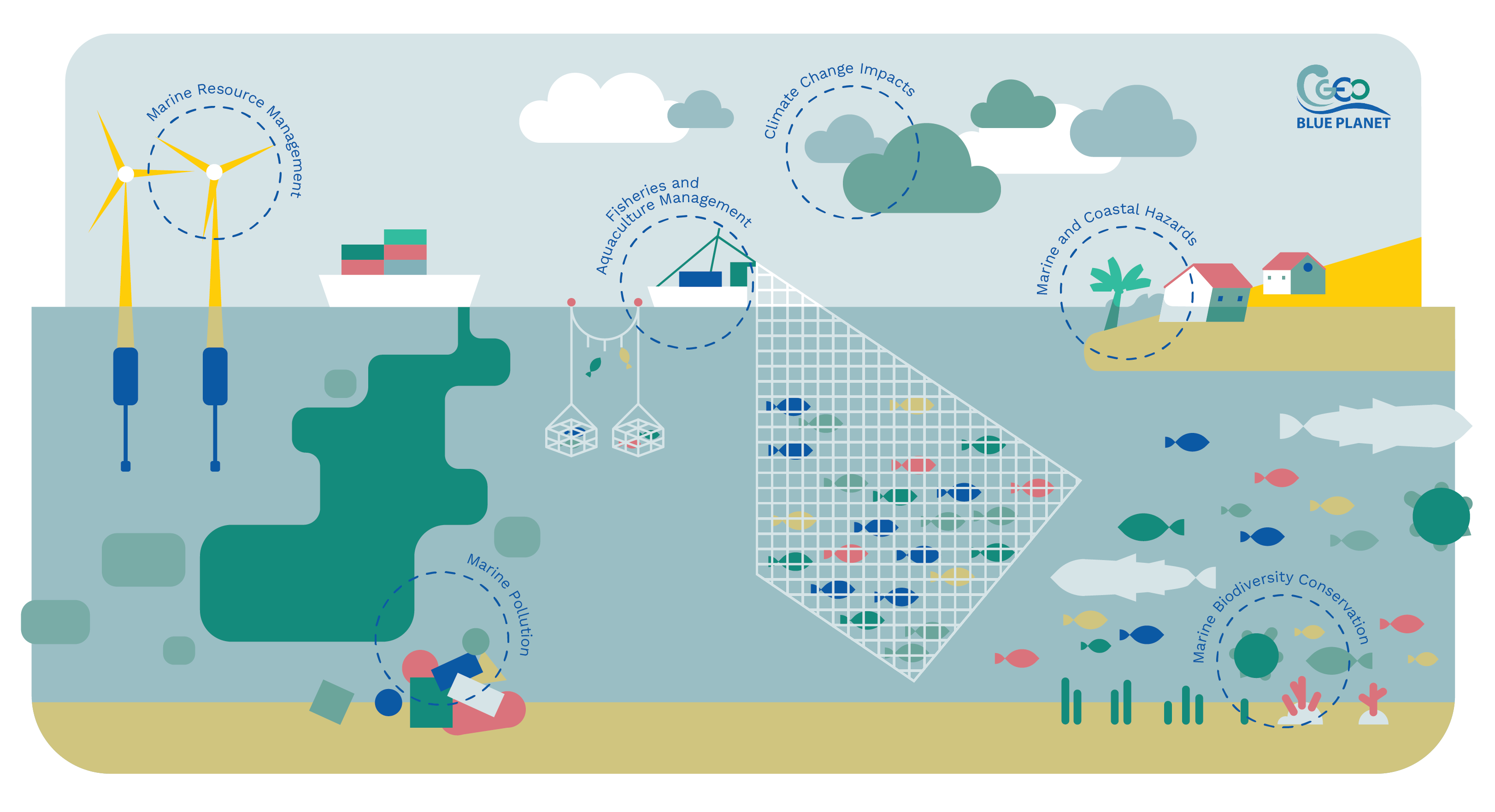Earth observations are data and information collected about our planet, whether atmospheric, oceanic or terrestrial. This includes space-based or remotely sensed data, as well as ground-based or in situ data. With this data, scientists can accurately and effectively gather information related to a multitude of parameters pertinent to oceans and coasts including sea surface temperature, bathymetry, tidal height and even the global migration of whales. Coordinated and open ocean and coastal observations enable decision-makers around the world to better understand the issues to shape more effective ocean and coastal policies. GEO Blue Planet conducts its activities with this in mind. Advanced technology, expert networks and coordinated efforts have allowed the global community to use these observations to address several challenges faced by the world’s oceans.
Here are some of the ocean and coastal challenges that can be addressed using Earth Observations. Click on the infographic to learn more.
Climate Change Impacts
The ocean plays a major role in regulating climate by storing and transferring heat around the globe, absorbing carbon dioxide, and influencing cloud cover and precipitation. Increased emissions of greenhouse gases have led to the greenhouse effect resulting in global warming. This warming has a direct impact on the ocean and is projected to create critical hazards for many ocean ecosystems and coastal communities. Satellites can be used to remotely sense increases in sea surface temperature. Instruments such as the VIIRS (Visible Infrared Imaging Radiometer Suite) sensor aboard the NOAA/NASA Suomi NPP satellite captures daily data related to sea surface temperature variations over time across different regions of the globe.
Sea level rise is another potential impact of climate change. This phenomenon can lead to a series of negative effects including coastal inundation, saltwater intrusion, shoreline erosion and the degradation of coastal ecosystems. Satellite altimeter radar measurements, when combined with precisely known spacecraft orbits, can be used to measure sea level on a global scale. According to NOAA NOS (National Oceanic and Atmospheric Administration National Ocean Service), long term changes in global mean sea level can be measured to provide a way to test climate models’ predictions of global warming. Sustained ocean observations are key to understanding the ocean’s role in climate and predicting regional and global climate. Data and information from ocean observations will continue to play a major role in manager and policy maker decisions on how to respond to and mitigating global climate change.
The GEO Blue Planet initiative can help unlock ocean-based solutions to climate change, Challenge five (5) of the UN Ocean Decade. Providing background information on Earth observation-based co-designed indicators can help mitigate the effects of climate change and improve services such as predictions for the ocean, climate and weather.
Check out the related current GEO Blue Planet activities:
- Climate adaptation
- Eutrophication
- Fisheries
- Coastline changes
Marine Resource Management
Ocean resources provide jobs, goods and services for billions of people around the world and have immense economic importance. These resources include food, fuel, renewable energy, minerals, sand and gravel and tourism. Sustainable development and management of ocean resources is widely recognized by the international community and required for sustained human well-being. Management of ocean resources requires a diverse network of sustained ocean observations which includes satellite measurements, buoys and deep ocean sensors. These measurements provide information that can be used by resource managers and industry to locate, and responsibly utilize ocean resources. GEO Blue Planet supports the development of innovative solutions, contributing directly to challenge four (4) of UN Decade, based on developing a sustainable and equitable ocean economy.
The development of innovative solutions directly contributes to the Ocean Decade challenge to develop a sustainable and equitable ocean economy (Challenge 4).
Check out the related GEO Blue Planet activities:
- Fisheries
- Climate adaption
Marine and Coastal Hazards
Each year natural disasters such as tsunamis, tropical cyclones and flooding cause considerable damage to life and property. Economic losses due to disasters worldwide have surpassed $100 billion USD annually since 2010. Additionally, anthropogenic marine and coastal disasters including oil spills and chemical accidents are widespread and, depending on the magnitude and location, can be devastating environmental disasters.
Ocean and coastal observations deliver data and information required to prepare, forecast, mitigate and recover from disasters. In many situations, including tsunamis and storm surge events, ocean and coastal observations from Earth satellites such as NOAA’s Geostationary Operational Environmental Satellites are required to provide warnings to coastal populations. Oil and chemical spills can be identified and tracked using ocean and coastal observations from Synthetic Aperture Radar (SAR) and multi-spectral satellite imagery. These instruments deliver highly accurate data, allowing managers to make informed mitigation decisions regarding these environmental disasters.
The GEO Blue Planet initiative can help increase community resilience to ocean hazards,
challenge six (6) of the UN Ocean Decade. Providing background information on Earth observation-based co-designed tools can help mitigate the effects of coastal and marine hazards.
Check out the related GEO Blue Planet activities:
- Sargassum
- Eutrophication
- Coastline changes
Marine Pollution
A clean ocean is essential for public health, ecosystem health and the economy. Degraded water quality can occur as a result of pollution from sewage discharge, oil spills, industrial waste, agricultural runoff, storm water runoff, and sediment runoff. Impacts of poor water quality include exposure to disease and harmful chemicals, reduction in viability of impact economically important fisheries species, hypoxia events and destruction of ecosystems. As coastal populations and development increase, coastal environments become at greater risk for water quality issues. Earth observations play a vital role in supplying decision makers with data and information about water quality. Ground-based (in situ) observations and satellite observations can be used together to monitor and forecast water quality across the globe.
The persistence of marine litter also contributes to marine pollution. From microplastics to derelict fishing gear, its various forms and sizes are found from coastal shores to the depths of the oceans, and even in remote areas far from human contact. Marine litter has become a multi-dimensional problem with economic, environmental, cultural, and human health costs. Ocean observation data from remote and in–situ sources can be used to inform policy related to marine litter observation and detection methods on a global scale.The GEO Blue Planet initiative can help us to understand and beat marine pollution, challenge one (1) of the UN Ocean Decade. Providing background information on Earth observation-based co-designed tools can help to mitigate the impacts of marine pollution and inform requisite ocean and coastal policies.
Check out the current related GEO Blue Planet activities:
- Marine Litter
- Oil spill
- Eutrophication
Fisheries and Aquaculture Management
Overfishing and marine habitat destruction are major threats to global food security. In recent decades, many regional and international fisheries regulations have been implemented such as catch limits, fisheries seasons, bycatch regulations and the establishment of marine protected areas. While regulations have had some success, seafood traceability and illegal unregulated fishing continue to threaten seafood sustainability. With a growing demand for seafood, the aquaculture industry has expanded and will continue to grow to ensure global food security. Proper management of fisheries stocks and aquaculture requires information from ocean observations. Ocean observations can provide information about toxic algae that might impact fisheries and aquaculture sites, identify and track illegal fishing activity and monitor environments that support fisheries stock species.
With increasing pressure on the world’s fisheries and a need for consistent sources of high-quality protein, aquaculture, the practice of rearing aquatic/marine animals and plants, is regarded as a sustainable alternative. Consistent monitoring of aquaculture sites allows for management of environmental pressures, such as sea surface temperature, pollution and habitat degradation. Ocean observations and monitoring also provides the aquaculture industry with information that can help ensure the health of their stocks and success of their industry. The GEO Blue Planet initiative can help sustainably feed the global ocean, challenge three (3) of the UN Ocean Decade. Earth observation-based co-designed tools can play an integral role in the management and sustainability of fisheries and aquaculture.
Check out the related current GEO Blue Planet activities:
- Fisheries
- Eutrophication
- Sargassum
Marine Biodiversity Conservation
The marine environment supplies many ecosystems that support biodiversity in coastal and open ocean habitats. Marine ecosystems provide many resources that are beneficial to society and a significant proportion of the world’s population depends intimately on the oceans and coasts for survival and well-being. The pressure on marine ecosystems and the resources they provide is increasing as threats introduced by land-use change, overfishing, climate change, the invasion of non-native species and other impacts of anthropogenic activities affect biodiversity. As environmental conditions change, species need to evolve and adapt to these changing conditions. Healthy marine ecosystems are important for society since they provide services including food security, feed for livestock, raw materials for medicines, building materials from coral rock and sand, and natural defenses against hazards such as coastal erosion and inundation.
Ocean observations that monitor biodiversity and measure species distribution and density in marine ecosystems enable policy makers to respond to, protect and manage ecosystems that are under threat. Marine ecosystems are integrally linked to global climate and monitoring and studying these ecosystems allows scientists to better predict the impact of climate change on biodiversity and human populations.
Ocean observations monitor diversity and species distribution and enable policy makers to develop solutions to better protect and restore ecosystems and biodiversity, actively addressing this major global challenge (Challenge two (2) of the UN Ocean Decade).
Check out the related current GEO Blue Planet activities:
- Climate adaptation
- Sargassum


